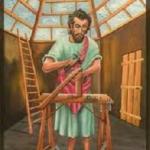A popular Christian writer got herself in trouble not long ago by suggesting on Twitter that most Christians have a hard time with texts in the Gospels that clearly show Jesus to be fully human. The specific passage she had in mind was Mark’s account of Jesus’ interaction with a Syrophoenician woman who asks Jesus to cast an “unclean spirit” out of her daughter. Jesus first refuses, saying that he does not intend to give his children’s (Jews’) bread to dogs (Gentiles such as her). In a classic retort, she says “Lord, even the dogs under the table eat the children’s crumbs.” Realizing that his first reaction was wrong and narrow-minded, and that he has just been put in his place, Jesus changes his mind—repents, in other words—compliments the woman on what she said, and casts the demon out of her daughter.

The most obvious interpretation of this text is that Jesus was having a bad day, is perhaps not entirely sure of the scope of his mission, apologized upon realizing that he had been wrong, and learned something. Something just about all of us experience on a daily basis. Angry tweets pushed back against the Christian writer’s use of this interpretation, though. One suggested that “this is what happens when someone denies that Jesus was God.” Except that no one was denying Jesus’ divinity; rather, it was being pointed out that he was also—according to Christian doctrine—fully human, an inconvenient doctrinal fact that many Christians would just as soon forget.
I have been reminded over the past few days of a very quick and revealing test of whether someone is fully human or not as I read Kingdom of the Blind, the latest entry in Louise Penny’s outstanding Chief Inspector Gamache mystery series. The book was released just two weeks ago, and my wife and I have both already finished it—that’s how good the series is. Gamache is the head of the homicide division of the Sûreté du Québec, Québec’s provincial police force. He’s just about my age (maybe four or five years younger), loves solving puzzles, poetry, good food, his wife, and the many inspectors and police officers who work for him. One of the many attractions of Penny’s series, now thirteen volumes long, is that it is set in Three Pines, Québec, a fictional town just a few dozen miles away from where I grew up in northern Vermont.
Gamache takes his position as a mentor for younger and less experienced officers very seriously, often imparting wisdom in a deliberate manner more appropriate to a professor than to a policeman. Penny takes her time filling us in on the back stories of her dozen or more repeating characters—Gamache is no exception. In this latest book, we are reminded of some unsolicited but crucially important advice that he received in almost mythic fashion from an old fisherman in a northern Québec diner early in his career. Each of Gamache’s protégé’s in turn have received this advice—four statements that every aspiring inspector should take to heart. “Get used to saying each of these on a regular basis and meaning it,” the old fisherman said.
I don’t know
I was wrong
I’m sorry
I need help
I suspect that the old fisherman’s advice is applicable to more than inspectors—these are truths at the heart of being human.
I Don’t Know. A number of years ago when I was an untenured professor, I gave the lead paper at an on-campus colloquium focused on a recent papal encyclical. I was mildly (I thought) critical of some aspects of the encyclical, something that did not fly with many of those present, particularly the dozens of parishioners from the Catholic church across the street who were in attendance.
During the question and answer period after the panel discussion, a guy in the front row directed the first question to me. “Dr. Morgan,” the fellow asked, “is there no room in philosophy for humility?” I responded to his question in a way I never had before and never have since—I laughed. “Yes, sir, there is plenty of room for humility in philosophy,” I answered. “The longer I do this, the more I realize on a daily basis how much I don’t know.” As Hamlet told his friend, “There are more things in heaven and earth, Horatio, than are dreamed of in your philosophy.”
What about Jesus? I once asked one of my best friends, a Catholic theologian, whether he thought that Jesus knew from the start that he was the son of God. After some silence, I was surprised (and pleased) when he answered, “I don’t know, but I think probably not.” That makes sense to me—uncertainty and openness to learning is such a fundamental part of being human that I think someone who actually knows everything is something other than human. Jesus learned something from his exchange with the Syrophoenician woman: He learned that his message was for more than the house of Israel. It was (and is) for everyone.
I Was Wrong. I had great fun when my sons were little trying to convince them that I am always right. This, of course, set them on a quest to catch me being wrong about something—I managed to sustain the illusion of God-like rectitude for a few weeks, but only by practicing my obfuscation and logic-bending skills on a regular basis. I wasn’t that good at it—I have some colleagues in my department who are still convinced of their infallibility in their fifties and sixties, in the face of regular and overwhelming evidence to the contrary. Makes for interesting department meetings.
The story from Mark is about as straightforward as it comes—Jesus was wrong, and the woman called him on it. His compliment to her and his long-distance healing of her daughter are direct evidence that he both recognizes his mistake and is immediately willing to reverse course. Would that we all were so ready to be wrong, make the wrong right, and move on.
I’m Sorry. I’m not sure how someone who can’t say “I’m sorry” without having a nervous breakdown can survive a marriage, parenthood, the workplace, friendships, a trip to the supermarket, or getting out of bed in the morning. If I needed evidence of what sort of person our current President is, I needed nothing more than when as a candidate he told a reporter that he had never asked for God’s forgiveness, because he had never done anything that he needed forgiveness for.
There is no record in the Gospels of Jesus saying “I’m sorry” or asking for forgiveness, but I’ll go out on a limb here. If he was really human, he said “I’m sorry”—more than once. Those two words are such a bridge builder that they are worth saying, even if you are not in the wrong. And when you are, such as Jesus was with the Syrophoenician woman, how difficult is it to imagine him saying “I’m sorry” to the woman he just insulted. After all the Jewish scriptures tell us that even God changes his mind and course.
I Need Help. My dachshund Frieda, who died just a couple of months ago, was only about fifteen inches long. She slept with Jeanne and me in bed every night we were home for the twelve years she was with us. Her going-to-bed routine was always the same. Frieda did not want to simply be picked up and deposited on the queen-sized bed that she could not jump on herself. She first stood on her hind legs leaning against the bed, hopping on her hind feet (each jump cleared the floor by about one inch). She wanted to do it herself. When Jeanne or I would grab her around her portly middle to lift her up, she made one final great leap to assist the transfer. I’m sure Frieda was convinced that given enough time she could complete the impossible task of getting into bed by herself.
She got that from me. Of the fisherman’s four statements, “I need help” is the toughest one for me to embrace. My general commitment to doing things by myself is not principled in the sense that I go around saying “If you want to get something done right, do it yourself” all the time. I’m not even a big fan of the American individualist stereotype. But somewhere early on, probably from my mother, I developed the habit of accomplishing as many tasks as possible by myself, rather than inviting others to work on the tasks with me. But I am occasionally reminded that in most important aspects of my life, I am like Frieda. I need help—a lot of it.
And so did Jesus, if we are to believe the Gospel stories. Jesus was a great delegator—he knew that by sending dozens of his disciples out into the highways and byways empowered with his message of love and healing, more good would be accomplished in less time than he could, as one individual, accomplish. He knew that believers infused with the Holy Spirit would spread the Good News in viral fashion exceeding anything he could do himself. And we know from the garden of Gethsemane that he was not sure he could accomplish his mission on his own. Jesus knew both the limitations of one and the power of many.
I don’t know. I was wrong. I’m sorry. I need help. These are touchstones for our humanity. And Jesus, above all else, was human.













